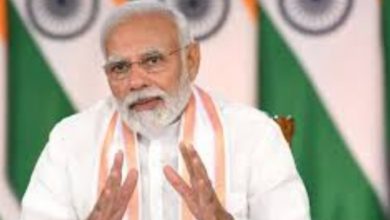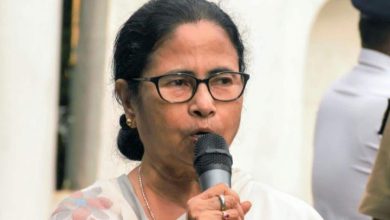Tanya’s ser was trapped in Mariupol. This is their story

On the second day of the war, Tanya quit her job as a tax accountant in Massachusetts and told her husband that she had to go home to Ukraine. Her ser and her ser’s two teenage sons were holed up in the bathroom of their home in Mariupol, a seaside city that was getting shelled. Tanya got a text from her: “We’re so scared.”
the sixth day of the war, her ser’s water had been cut. They couldn’t even flush the toilet. “We’ll use the cat litter box,” her ser wrote. Go to a bomb shelter, Tanya urged. Then, suddenly, the text messages stopped.
Tanya sobbed, imagining them dead. But her father, who lives in the pro-Russian city of Donetsk in eastern Ukraine, didn’t believe that Russian troops would hurt them. He called it fake news, dismissing the images of destruction. He sent her video of Russian soldiers saying: “Don’t be afraid. We just came here to free you.”
Tanya cursed him out and blocked him on her messaging app. The next day, she caught a flight to Poland.
🗞️ Subscribe Now: Get Express Premium to access the best Election reporting and analysis 🗞️
I met Tanya in Boston’s airport on March 2, as we waited for a flight to Warsaw. I saw her Ukrainian passport and her eyes, puffy from crying, and asked her to tell me her story. I ended up traveling with her to the Ukrainian border and have kept in touch with her ever since. Tanya is a nickname — she didn’t want to use her real name, to protect her parents, who she feared might face retaliation in Donetsk for her choices.
The war in Ukraine is often portrayed as a battle between autocracy and democracy; the East against the West. Tanya’s story reveals that, for many families, it can also feel like a civil war, pitting the old against the young. Tanya’s parents support Russia, even now. “We are Russian,” her father told her. Old people in Donetsk, like Tanya’s parents, are nostalgic about the Soviet Union, she told me. They are the welcoming committee that Vladimir Putin told Russians to expect when he ordered this invasion.
But Tanya, like so many Russian speakers of her generation, sided with Ukraine. “People my age or younger,” she said, “they don’t want to go back.”
Every Ukrainian I interviewed who grew up speaking Russian at home had a story like Tanya’s. Russian speakers, who make up roughly one-quarter of Ukraine’s population, were favored during the Soviet era. But Tanya’s generation came of age as communism crumbled. They became Ukrainian in a way their parents never did. Volodymyr Zelenskyy — a Russian speaker young enough to be Putin’s son — is a prime example of this. He was elected Ukraine’s president with a wide majority, and many of his supporters wanted him to stop Russia from meddling in Ukraine’s affairs. He did so more boldly than any previous Ukrainian president had dared.
Tanya was born in Volnovakha, a town outside Donetsk, in 1978. She turned 11 the year the Berlin Wall fell and was 13 when Ukrainians voted overwhelmingly to break away from the Soviet Union. She says she was the first in her class to resign from the Pioneers, a commun version of the Girl Scouts. She’d always hated the propaganda about “Grandpa Lenin” and the expectation that she should never let her brightness show. Back then, panties came in one color: beige. “If you wanted it black, you had to dye it,” she told me. The dye stained her mother’s midriff. Somehow, Tanya knew that better underwear was out there, even if she’d never seen it.
She learned the Ukrainian language in college when she was 20. She’d always been told that it was the tongue of country bumpkins; educated people spoke Russian. Nonetheless, Tanya fell in love with it.
But she didn’t actually feel Ukrainian until 2013 — at age 35 — when protests in Kyiv swept President Viktor Yanukovych from power after he backed out of a trade deal with the European Union. Tanya agreed with the protesters, but her parents were outraged that Yanukovych — a president they’d voted for — had been chased away an unruly mob. They dismissed it as a coup that had been financed the United States. They joined a protest in the city square. “Putin, come and help us,” they chanted.
In 2014, her parents voted to break away from Ukraine and form the self-proclaimed Donetsk People’s Republic, and the war in that region began. “I call it the Donetsk Retired People’s Republic,” Tanya told me, rolling her eyes. Pro-Russian separats had been battling the Ukrainian army over the city for months, when Tanya packed her car and moved to “Free Ukraine,” like nearly every other young person she knew. She eventually settled in Mariupol, a charming city the sea that was home to some 400,000 people.
Tanya fell in love with an American she’d met online and moved to the United States in 2020. Her ser took over her rented apartment. Then Tanya helped her buy a cozy house in the center of Mariupol, a block from City Hall. Tanya kept in close touch with her parents, too, although she avoided talking to them about politics. During the pandemic, her parents sent her videos from Donetsk, of their rooster and the apple trees, at the house where windows had once been shattered a mine explosion during the years of conflict. The war over Donetsk seemed endless. Tanya’s parents blamed Ukraine, complaining that it was trying to kill them to avoid paying for their retirement.
Nobody Tanya knew in Mariupol expected Russia to invade. They all thought the Russian troops amassing on the borders were a bluff. Tanya urged her ser to stock up on food, just in case. She watched the mayor of Mariupol encourage city residents to stand strong, as the Russians attacked. She heard from friends in Kyiv who were signing up to fight. She decided that she had to do something, so she collected supplies for Ukraine. A group called Sunflower of Peace gave her medicine. She bought more with her own money. She filled three huge suitcases with drone parts, insulin, painkillers, tourniquets and a brand of coagulant called BleedStop.
We landed in Warsaw on the eighth day of the war. A Polish man Tanya knew had agreed to drive her to the Ukrainian border, where she planned to hand off the supplies to a friend of a friend who would take them deeper into Ukraine. I wanted to go to the border, too, so I caught a ride.
During the five-hour drive, Tanya sat in the back seat, lost in thought. She’d gotten a text from her ser, who had finally made it to a bomb shelter. But the shelter had no electricity and almost no food or water. Tanya’s ser and her sons had tried to leave to look for food, but a mine exploded right in front of them, forcing them to run back inside. One of the sons had hurt his leg. A few days later, Russian airstrikes destroyed a hospital maternity ward and, the following week, a theater where hundreds had taken shelter. A bomb left a giant crater near Tanya’s ser’s house. Mariupol was becoming a death trap.
We arrived at the Polish border town of Korczowa and searched for Oksana, the wife of a border guard, who made daily trips ferrying supplies from Poland into Ukraine. We waited for her at a shopping mall that had been turned into a welcome center for refugees. It was a surreal scene. Mannequins in fashionable clothes presided over rows of cots crowded with women who had fled with nothing but backpacks, children and pets. Tanya walked through the mall and burst into tears, thinking about her ser.
Oksana arrived. She hugged Tanya and lit a cigarette with manicured nails.
“Everything is OK,” she told Tanya, smiling. “They are fighting.” Kyiv was holding strong.
On the 20th day of the war, Tanya finally got through on the phone to a man in Mariupol who was staying with her ser’s neighbor. She’d heard there would be a pause in the fighting to allow a humanitarian convoy out of the city. “Today is a good chance to escape,” Tanya told him. She asked him to tell her ser to leave right away. “Save their lives,” she pleaded.
Tanya’s ser crammed her sons, her cat and another family from the bomb shelter into her Kia Ceed. Five days later, they arrived in western Ukraine, at a place that Tanya had arranged. Tanya hadn’t spoken to her parents in weeks. But on their mother’s birthday, she called home.
“This is your birthday gift,” Tanya told her mother. “Your daughter and your grandsons survived.”





